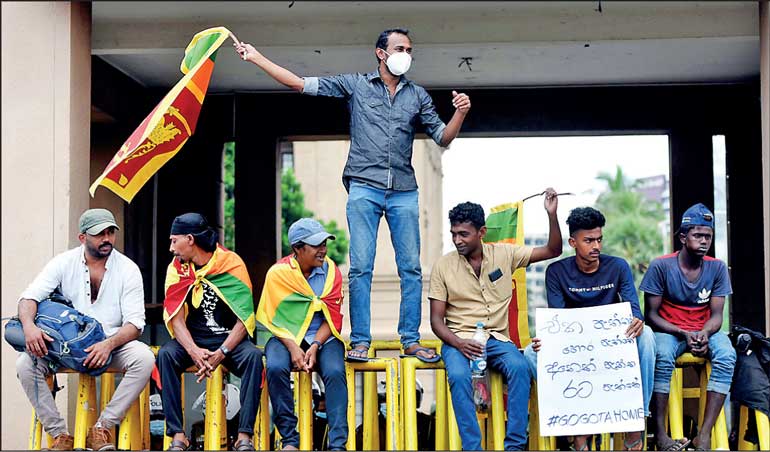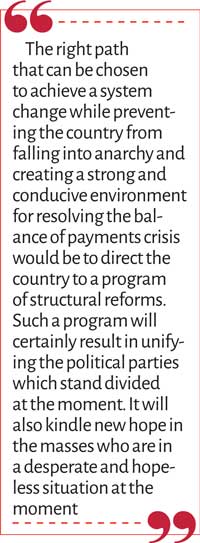Tuesday Mar 03, 2026
Tuesday Mar 03, 2026
Friday, 27 May 2022 00:28 - - {{hitsCtrl.values.hits}}

The biggest challenge facing the country at the moment is to prevent the country from plunging into anarchy
 In the immediate aftermath of the ending of the internal civil war, it occurred to me that Sri Lanka would soon go bankrupt and plunge into anarchy in the face of the deterioration of the State and the socio-political system caused by the neglect of essential reforms. By that time, the Sri Lankan State had faced two major internal uprisings; though they had been defeated with much difficulty, these two uprisings had caused serious damage to the State and the socio-political system.
In the immediate aftermath of the ending of the internal civil war, it occurred to me that Sri Lanka would soon go bankrupt and plunge into anarchy in the face of the deterioration of the State and the socio-political system caused by the neglect of essential reforms. By that time, the Sri Lankan State had faced two major internal uprisings; though they had been defeated with much difficulty, these two uprisings had caused serious damage to the State and the socio-political system.
Both uprisings were defeated, not immediately, but only after they had spread far and wide and gained substantial momentum and the rebels were on the verge of victory. The rebels of the second Sinhala uprising of the JVP managed to sustain their struggle for as long as 24 months. On the contrary, the rebels of the Tamil uprising of the LTTE had been able to sustain their violent struggle for as long as 24 years. Although the security forces were able to defeat these two horrific insurrections long after they had broken out, the damage caused by them to the security forces, the State, the Sinhala and Tamil community and the socio-political system of the country was immense.
The death toll of the two insurrections could be more than 150,000. The number of victims of torture and oppression could be three to four times the number of deaths. In these two uprisings, the rebels as well as the security forces unleashed brutality competitively on the society at the optimum level possible. This situation in turn had caused all the people to be more or less distorted and sick emotionally at least. In that particular environment, the country was in a state where it was imperative to have been directed to a major reform program.
Ignoring reforms
It has become an indispensable condition to bring forward a reform program to rectify the serious damage done to the State and the socio-political system by the two insurrections mentioned above and the establishment of a presidential system of governance where the President stands above the rule of law in order to ensure the forward march of the country. But, the excitement created by the defeat of Prabhakaran had eclipsed the ability to grasp this reality in its right perspective. 
On the eve of the second anniversary of the war victory I ventured to convince the Head of State (President Mahinda Rajapaksa) of the importance of directing the country towards a reform program. In response to my request, I was given an opportunity to discuss the matter with the President; Lalith Weeratunga, Secretary to the President and Minister Dullas Alahapperuma were also present in that discussion. The discussion lasted for about three hours, but the President was not able to grasp the meaning of the reform program that I proposed.
Thereafter, on the occasion of the 25th anniversary of the Ravaya newspaper in 2012, where the President and other major political party leaders took part in the event, I stressed to them the urgency of the need to orientate the country to a reform program, but my appeal did not materialise as there was no successful dialogue emanated from it.
Consequently, I was compelled to write two books on the subject titled “Saving Sri Lanka” and “Tragedy of the Nation” to socialise my view and prove that “in a situation where the essential reforms are continued to be neglected, the deterioration of the state and the socio-political system will aggravate and intensify and the country will inevitably fall into a state of bankruptcy and anarchy where the socio-political structure and the economic system will be ruined”. Subsequently, I was compelled to write hundreds of articles to convince the society of the need for initiating reforms to overcome the impending disaster.
Mangala Samaraweera
I made the keynote address at the launching of the Biography of Mangala Samaraweera which was held on the eve of the last presidential election. I based my address on my view about the future of Sri Lanka. I stressed that whoever wins the next presidential election, the socio-political system and the economy of the country is likely to collapse and the country is doomed to end up in a state of bankruptcy and anarchy. I justified my interpretation pointing out the chaotic nature of the country’s affairs since independence.
Mangala Samaraweera, making the vote of thanks, acknowledged my interpretation and expressed openly his regret to the people for being a partner of the damage caused to the people by the wrongdoings of various governments that had come to power from time to time, where he too had played a role. In a telephone conversation he had with me during the presidential election, he said that the speech I made at the launching of his biography used to reverberate in his ears from time to time. Subsequently, he withdrew himself from traditional politics and became a staunch supporter appearing for the need of profound change in the entire system.
At some particular point, he seemed to believe that he too would be able to play a pioneering role in opening of the doors to initiate a major reform program. He always appeared for the interests of the younger generation, but unfortunately for the country he died before the youth uprising. What would he have done if he had been alive now? I believe that he, while pointing to the youth the need for bringing their struggle within a statutory framework, would have adopted a policy of supporting them to achieve the true aspirations of the youth uprising.
Beckoning for anarchy
The most important thing here is not the coming true of my prediction about the course of the Sri Lankan crisis, but the failure of the country to understand the horrific and destructive nature inherent in it, which can be considered as the most dreadful component of it. Anarchy implies a dreadful and chaotic situation in which the authority of the state collapses without having a pre-emptive authority to replace it. Bertrand Russell, a well-known British philosopher and social critic in his book titled “Power: A New Social Analysis”, states that “anarchy is more dangerous and destructive than dictatorship.” Therefore he maintains that in order to defeat anarchy, at least a regime of dictatorial form is necessary to be established first. But the scholars in Sri Lanka seem to think that anarchy is better than the current corrupt rule of the Rajapaksa family.
The attack made on 9 May by a group of supporters of the ruling party who came from Temple Trees against the protesters demonstrating at the Galle Face struggle grounds can be considered as an incident which is contrary to the law, contemptible and brutal. But, the counter attacks made on the homes, property and, rarely on the lives of ruling party MPs and some key Government supporters in response to that could be considered several times more horrific and brutal than the attack on the demonstrators at the Galle Face grounds. The general public may have got involved in the above attacks, but those who have mobilised them could not be ordinary civilians.
During the past two or three days commencing from the 9th, the country was in a state of delirium where it had lost its proper sense and the gangsters were behaving as if possessed by a frenzied obsession. The country was heading towards the abyss of anarchy. The appointment of a new Prime Minister symbolically marked the formation of a new government; and it posed a major setback to the adverse journey towards anarchy. Some are describing this change that has taken place consequent to the appointment of the new Prime Minister as a measure adopted to save the “Rajapaksa government which had been thrust against the wall.” This measure may have been beneficial for the Rajapaksa government, but it can be said to have been more for the benefit of the country than that of the Rajapaksas themselves. If the Rajapaksa regime is going to be defeated by unconstitutional means, the result will be a more dangerous anarchy instead of a better alternative regime which is analogous to falling out of the frying pan into the fire.
Path to choose
Not only the Rajapaksa regime but also the wicked and corrupt system that prevails in the country must be defeated. It must be done through a structural reform program which conforms to the Constitution and not by a program that forcibly overthrows the Government, plunging the country to a state of anarchy. The biggest challenge facing the country at the moment is to prevent the country from plunging into anarchy. The right path that can be chosen to achieve a system change while preventing the country from falling into anarchy and creating a strong and conducive environment for resolving the balance of payments crisis would be to direct the country to a program of structural reforms. Such a program will certainly result in unifying the political parties which stand divided at the moment. It will also kindle new hope in the masses who are in a desperate and hopeless situation at the moment.
The proposed reform program can be implemented in two main phases as it was done in South Africa. While endeavouring to resolve the balance of payments crisis, it would be possible to reach consensus on a suitable system of governance and establish the rules and policies needed to hold free and fair elections to elect representatives under the proposed new system of administration agreed upon. The Election Commission could be given necessary powers to ensure the internal democracy of the political parties. The policies and guidelines can be formulated for regulating the funds received by political parties and candidates for election campaigns and monitor their expenses.
All these activities could be included in the list of work to be performed during the Phase 1 of the reform program. The activities of Phase I and Phase II must be treated as two phases of a single reform program; and it must be made a statutory obligation for whichever party that comes to power in the election to implement the Phase II of the reform program uninterruptedly.
It is also important that the United Nations Organization is involved in this reform program as an observer and secure necessary guidance and technical assistance, especially in the formulation of a special Interim Constitution and adopting a Constitution of People’s participation. The political parties do not have a capacity to deviate entirely from a reform program that will bring a positive and profound change in the system. Therefore, the reform program might even serve as a solid foundation for the formation of an all-party government.